Local SEO Structures for Excavation Companies
As a grandson of a man that owned his own Excavation Company, I know how laser focused on working that doing any sort of advertising outside of wearing a hat with your logo on it, can escape your seemingly endless list of priorities.
While it’s a little more complicated than signs in yards and logos on clothes, the shift of technological advances have created a whole new foundation to work on when it comes to reaching the clients seeking your services and, most importantly, You.
Local SEO isn’t just a trend, it’s a standard for your business in order to stand among the competition in the World Wide Web.
Key takeaways here when its placed together
What SEO is, Simplified
Search Engine Optimization (SEO) is the webpage work that sets up structures, using a various amount of methods and techniques, in order for you to rank higher when people are looking for those services that you are offering, in your local areas of operation.
When people search for excavation, they usually type things into Google, such as:
‘Excavation Company Near me’
‘Trench Digging services in [City]’
‘[Location + Excavation Service/Company]’
SEO is akin to the digital version of foundation clearing, laying the ‘groundwork’ needed to build up the empire that is your business.
The better your SEO is the higher you rank.
The Standards of Optimizing Your Local Listings for SEO
Excavation companies are the ones that lay the groundwork for foundations for buildings to be crafted, from trenching utility lines, to digging a pond, the services need a online presence in order to reach the clients that need your services.
Your Local Listing Directories are how your customers are going to know you are reputable, professional, and can be trusted.
Google Business Profile – Your Virtual Billboard
Your GMB profile is one of the most important parts of your on-page optimization.
That little pin on the Google Map is going to bring in 40-45% of your clientele so this isn’t a suggestion.
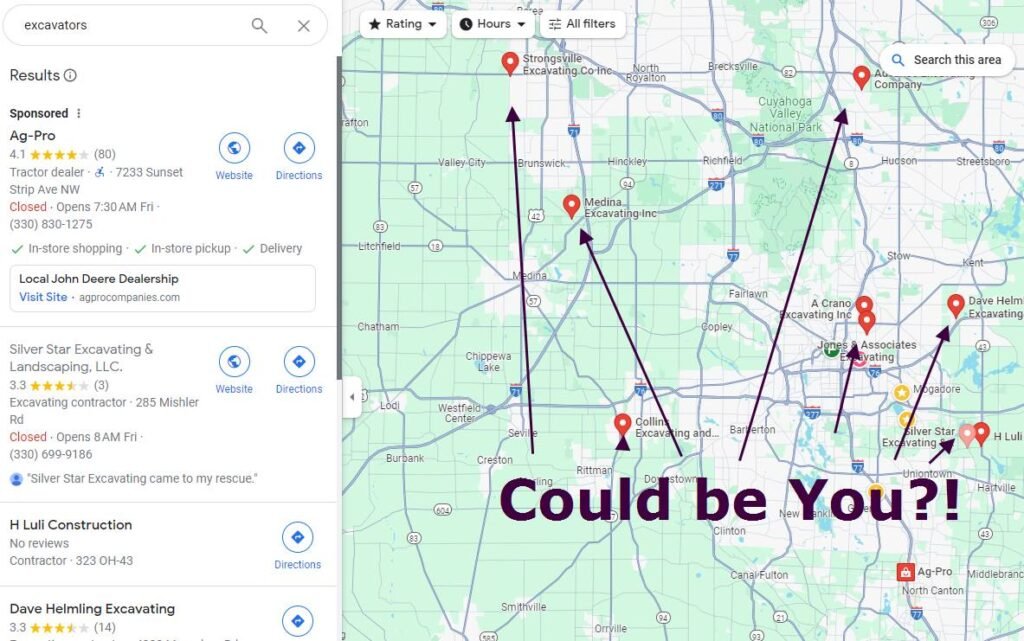
What to do:
- Claim and verify your listing
- Fill out every detail: Address, phone number, services
- Keep your NAP (Name, Address, Phone) consistent across the web
Customer Reviews: The Fuel for Your Local SEO Engine
When you have your Google My Business account set up and operational, you need to cultivate that rating because that is how you rank higher on Maps. After a successfully completed job, its okay to ask for a review, but don’t beg for 5 stars.
A thoughtful, authentic review is gonna attract more customers. A good 5 star is still 5 stars, but a detailed review that may mention you or a coworker by name, providing detail with your customer service ability, and your professionalism of work done will glow for future potential clients, and also the all mighty Google loves seeing customer feed back providing authentic information about your business.
- Encourage Reviews: After every successful project, nudge your customers to leave a review. Just a little “We’d love your feedback” can go a long way. The more authentic the review the more it illustrates your ranking, building better authority. ‘Wow so great!’ Seems robotic wouldn’t you agree?
- Respond to Reviews: Communicate with them as a professional that has emotions and empathy, address their concerns and see if you can win them back in good graces.
Bing Places
Bing is still apart of the online world, and have been increasing its market share (8%), so it’s best not to overlook its uses in the SEO game.
First, set up your site in Bing Webmaster Tools
- Sign Up: Create an account at Bing Webmaster Tools and verify your site ownership.
- Submit Your Sitemap: Upload your sitemap to help Bing crawl and index your site efficiently.
- Monitor and Optimize: Use the provided tools to track your site’s performance and address any issues.
Unique features and benefits of Bing Webmaster Tools
- Access detailed keyword insights specific to Bing’s search engine. This is a good way to do keyword research for an already up and running website.
- Receive regular SEO reports highlighting opportunities and issues.
- Analyze your site’s backlink profile and monitor new links.
- Perform regular site scans to identify and fix technical SEO issues.
Bing is very easy to setup, and can bring you in some clients as it has for our clients.
Local Link Building – Your Digital Handshakes
The online network that is Backlinks is like the spine of your online interactions.
Local link building is like getting a thumbs-up from other websites, giving you that credibility that search engines like Google is looking for.
What to do:
- Partner with local businesses for link exchanges
- Sponsor local events or post guest blogs
- Get featured in local news or industry-specific directories
Email outreach is a viable method. It’s going to be extensive doing so, just gathering the lists and even verifying the proper backlinks takes time.
Outsourcing Backlink gathering is a option, it will save you a lot of time, at the cost of some money, and once you have a solid cache of authentic and powerful backlinks it will be next to impossible to shake you from the high ranking positions.
Back Links is the spine of your foundations for SEO. You need to be able to stand among others when it comes to earning higher ranking metrics, and backlinks is how you earn authority over the competition.
A well cultivated and strong backlink profile is the edge your excavation company, well any company, needs in this new digital age.
Quality Over Quantity: Backlinks
One high-quality backlink can have more impact than a dozen low-quality ones. Earning backlinks is akin to making load bearing walls when excavating. They keep your online presence strong and lasting.
- Evaluate the Landscape: Focus on websites that are relevant to the excavation industry.
- Inspect the Foundation: Aim for domains with high authority that will add credibility to yours.
- Drill into Relationships: Forge connections with bloggers, industry insiders, and companies relevant to yours
Local Partnerships Networking Like a Pro
Now, for the scoop on local partnerships: it’s simple—you scratch their back, they include a link to your site.
Networking and collaborating can help your influence grow within your communities.
- Make Friends with Local Suppliers: They’re not just suppliers; they’re potential allies in the digital space. Collaborate and co-create content that benefits both parties.
- Connect with Local Contractors: They’re the bread to our butter, the hydraulic to our arm. Swap stories and links – it’s a mutual build-up.
- Get Involved in the Community: Whether it’s sponsoring a little league team or participating in a local charity event, involvement leads to connections, and connections lead to links.
Having relevant backlinks is a good strategy to take into consideration when building your backlink profile.
Reaching out to someone who is a Landscape Designer or a Home Designer can help round out edges and expand online presence.
Staking in Online Local Directories
Very similar to handing out your business card, or having your signs stapled to the telephone poles everyone drives by, online directories get your business scattered throughout the web.
These digital markers help both clients and Google Bots find and see your businesses influence.
Online directories vary from local to world wide with sites such as:
- Angies.com
- Thumbtack.com
- Houzz.com
- Homeadvisor.com
- Yelp.com
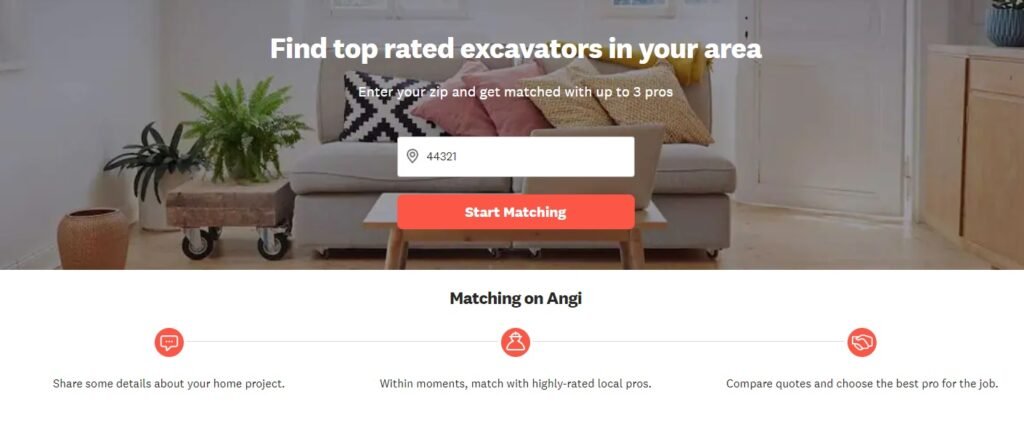
To more bureaucratic types:
- The BBB
- Your Local Chambers of Commerce
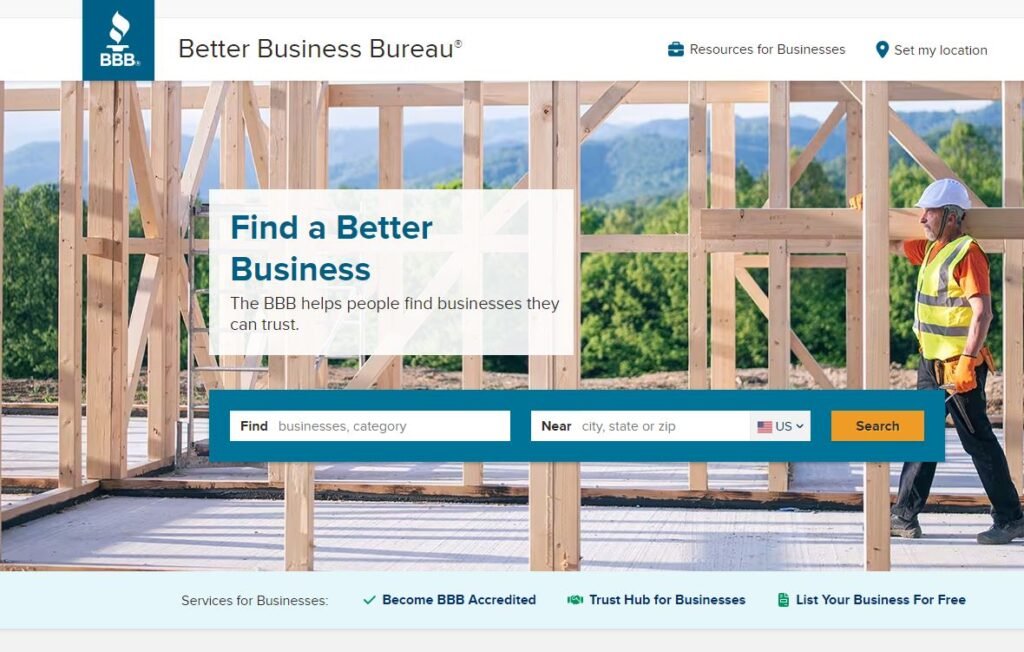
To more Industry Relevant Niche (or relevant) Directories:
- Shaledirectories.com
- Contractormarkingnetwork.com
Can offer either a pay per lead model or can list you for free, with some advertising. These help establish you are indeed a company, that offers the services you are willing to offer.
Please note there might be local directories or local citation sites in your county, city, or state that you can add your NAP (Name, address, and phone number) to. We only recommend Facebook, LinkedIn, and Twitter/X for social media accounts.
The rest are kind of pointless because they bring no value in bringing in new clients as a local service-based business owner.
Smart Keyword Strategies for Excavation Businesses
Having a plan for your keywords is one of the integral parts of your Local SEO. A well-placed powerful keyword is like your load bearing braces that help keep a foundation in its place.
Having a strategy will take you a lot further than copying and pasting everything you see in the top spots.
Know Your Keywords
First off, we’re digging into keywords. Not any keywords, but the ones that local clients throw into search engines when that pipe needs its trench to be homed in. What to do:
- Research local keywords (e.g., ” Professional Excavation services in [Your City]”)
- Integrate them naturally onto your website
- Optimize your service pages and blog content
You can do this by using tools like:
- SEMRush
- SERPFox
- Moz
Will help you narrow in on keywords that are currently being searched for. These tools are vital in laying the groundwork that is your online SEO.
With your list of high ranking keywords and phrases, don’t just slap them in anywhere. Having them placed in the right areas will boost your webpages authority, thereby giving it higher power to rank.
Digging Deeper: Long-Tail Keywords for Niche Targeting
‘Long-Tail keywords’ are your phrases that target more of a specific service, so when someone types in ‘Emergency excavation services after a flood in North Dakota’ your services are the first to rank in the search results.
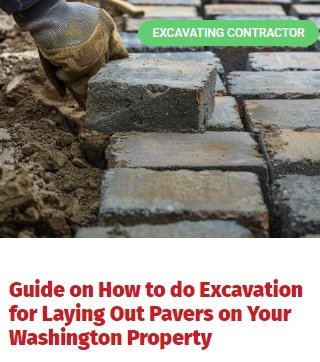
These detailed search terms mean we’re targeting the right crowd – not just any crowd. They might have lower search volumes, but they attract visitors who are looking with purpose, that exact service you are able to help them with. These are the clients you are looking for, because they are the ones that need you.
Why Long-Tails?:
- Lower competition
- Higher conversion potential
- Precise targeting
How to Optimize with Long-Tails:
- Integrate them in meta descriptions, tags, and content
- Align them with specific services and local areas
- Monitor performance and refine strategy
On-Page Optimization
Your website is your digital banner, sales person, reflection of your companies purpose and vision.
Your on-page SEO is how you catch your clients, with eye-catching words niche specific services and keywords.
Answering what people are searching for helps win Google snippets, because Google has a lot of work it constantly needs to do so if you can provide information gain swiftly, it earns even more favor with the bots.
Local Niche Service Pages
In our experience, creating local niche specific service pages is one of those important pillars for your online SEO.
Think about it, just having a webpage, in one area (even a wide one) leaves you as a small fish in a big pond, but if you spread out your companies name across all areas, with all your services matching for each of those cities, it makes you that much more recognizable and reputable.
Some of our proven examples go a lot like:
- [Specific Location + Specific Niche]
‘Trench Digging Services for Steels Corners, Ohio’
By doing this, you’re signaling to search engines with geo tracking to rank your niche service in a more specific area.

This is like building an interlinking and locking web to add to the World Wide Web. It covers a lot of the work that the bots are going to reach for next when it comes to your information.
You’re giving the what where how why and when it is searching for, and giving more information for each.
Changing Your SEO Title Tag For Google Bots Crawl
Of course, we want the eyes of clients to be caught, another important factor is playing by the rules that is Search engines, and yes the first and most important is Google, when you update and index your pages if you have things out of place or hard to read, things that don’t make sense, Googles bots will dismiss it to rank lower on the scale.
Title tags: These are the big, bold headlines in search results. Make sure yours are as catchy as a pop song chorus and as precise as a GPS coordinate. Every page needs a unique title, ideally with your main keyword front and center.

Your Title Tag should follow along these parameters:
[Niche + company Niche = targeted service keyword] Residential Excavation Services You Need for Your Home Project
In some cases the formula is backwards in the search results page but more often than not, the example is the typical standard you should aim for.
Meta descriptions: This is your elevator pitch in the search results. Keep it under 160 characters, make it punchy, and sprinkle in those keywords like they’re seeds you want to grow into clicks.
- Example Title Tag: “Expert Excavation Services in [Your City] | Blue Sky Advertisement”
- Example Meta Description: “Looking for top-notch excavation in [Your City]? Blue Sky Advertisement unearths quality with precision. Click to learn more!”
Tailored Blog Content
There’s a few types of blog styles but the main two for SEO lies between Informational and Commercial.
As a business that offers a service, where you go to them, combining the two is optimal.
When someone is searching for excavation they often use search phrases, providing that information they are searching for is ideal, but having them understand that you do exactly what they are searching for is just good business.
Catching the eyes of potential clients by answering the keyword queries:
What?: ‘What are the top reasons to choose [Your company] for your next Trench Digging project’
When?: ‘When is the best season for Foundation Digging?’
Where?: ‘Local Excavation in [Location]’
How?: ‘How to DIY Excavation using Hand Tools’
Why?: ‘Why you need Excavation Services for Your Next Project’
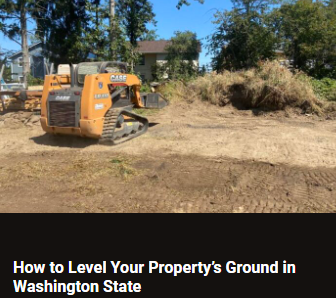
Covering these bases with different niche answers, that encompass all your services in different locations is a ideal strategy, to help your digital reach.
Social Media and Local Engagement
Its not all keyword optimization to make your business look appealing on the internet. It’s also about ingratiating yourself with the locals through social media.
It’s not enough to just break ground; you gotta break the internet with your community spirit, too.
- Local Flair on Social Platforms: You want to be more than just a name; you want to be the neighborhood hero. How? Showcase your community involvement. Putting a spotlight on local projects or sponsorships on social media gives your followers a taste of your commitment to their area.
- Authentic Conversations: We believe in ditching the corporate jargon. Instead, we champion down-to-earth interactions with followers. Ask for opinions on your latest project, or get the laughing with dad level excavation puns—just to keep things light!
- Tag Your Locations
- Always tag your location. It’s like staking a claim on digital land. Proving your shovels broke ground here.
- Engage with local hashtags or trends to show that we’re in sync with what’s happening around town. ‘#ecofriendly’
| Platform | Ideal Content Style | Engagement Tip |
| Community event highlights | Host Q&A sessions | |
| Behind-the-scenes project snaps | Use local hashtags | |
| Industry insights | Connect with local businesses | |
| Quick project updates | Jump in local conversations |
Remember, it’s not about hammering followers with sales pitches. It’s about building relationships—one post, one like, one community at a time.
Cause in excavation, as we know, it’s about laying the foundation both offline and online.
Public Relations (PR)
We love PR, who doesn’t? When it comes to SEO and PR its a match made in heaven.
There’s places like EINPresswire.com that do the PR for you, just take into consideration you have to bring worthwhile content to them, and they handle the rest of the work.
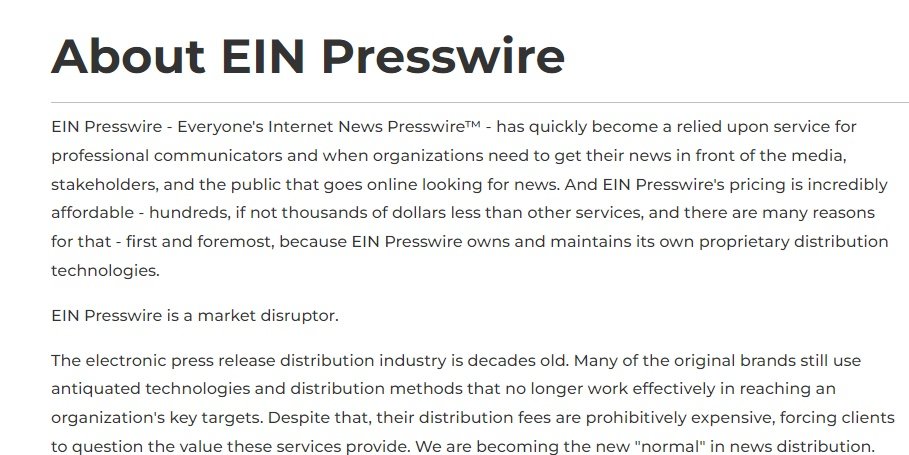
Making your Site User Friendly
It’s not the most important thing, but it does show that you care about your client’s time.
Having mobile optimization is almost a must in today’s age. Almost everyone has a phone, but not everyone has a computer. Having your webpages optimized for mobile friendly users is going to help in customer attention retention.
This goes hand in hand with speed of your website. Maybe your video loop of a recent job that you had as a background for your title wasn’t appearing by the time they went scrolling through your website. Losing interest because they couldn’t navigate a maze that wasn’t even loaded.
In our experience, have it at least 50% faster than your competitors is nominal, but 60+% is optimal.
How users interact is one of the important factors of how search engines determine authority (sourced from a recent Google link.
SEO Tools You Can Use for Your Local Excavation Business
Free SEO tools for local businesses
- Moz Local: Assists in managing your business listings across various online directories.
- Bing Webmaster Tools: Offers similar usability to Google Search Console but for Bing.
- Google Search Console: Helps monitor your site’s presence in Google Search results and identify any issues.
- Google Analytics: Provides insights into your website traffic, user behavior, and conversions.
Paid SEO tools and their benefits
- SEMrush: Cheaper Option $129.95 per month
- BrightLocal: Automates your citation and directory creation process. Unfortunately, they will be removed shortly after canceling your subscription. We recommend you do them by hand for the main bulk of your citations or directory pages.
- Ahrefs: More expensive, but better for link building. $129.99 starting, but does not have the same features of SEMRush. $200+ package gives you better features than SEMRush.
- Moz Pro: We haven’t used this in years. We advise you to avoid using the paid version of Moz.





